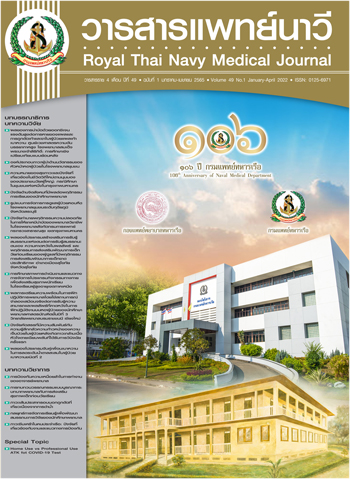Depression in Seafarers: The Work-related Factors and Preventive Approaches
Main Article Content
Abstract
Seafarers are maritime professionals who are exposed to dangerous working conditions and deal with specific work-environmental factors. These factors can contribute to depression and if treatment is delayed, it will develop to depressive disorder which can harm life. Thus, prevention of depression among seafarers should be emphasized. However, studies relating to depression in seafarers are rare and not widely pervasive. In this academic article, the authors gathered related literature and studies to describe depression and work-related factors among seafarers. These factors included working conditions and working environments. The depression assessment and preventive approaches were also provided for health care service team and other related professional to apply it in real situation appropriately, and at the same time it can be a basis of other research design to be further developed.
Article Details

This work is licensed under a Creative Commons Attribution-NonCommercial-NoDerivatives 4.0 International License.
References
Kaewkla C, Wongwanit P, Sujirat A, Supanitayanon T, Editor. Maritime medicine Royal Thai Navy. Nonthaburi: Sahamitra printing and publishing; 2014. (in Thai).
Prongnamchai S, Lawang K, Yongsiri S, Dinchuthai P, Chaiwanit P. A management model for health status and illness among maritime commercial crews. Burapha Journal of Medicine 2019;5(2):50-69. (in Thai).
Mellbye A, Carter T. Seafarers’ depression and suicide. International Maritime Health 2017;68(2):108-14.
Supanitayanon T, Chaikul T. Introduction to maritime medicine. Royal Thai Navy Medical Journal 2004;41(1):17-25. (in Thai).
Lueboonthavatchai O, Lueboonthavatchai P. Psychosocial treatment for depressive disorder. Bangkok: Chulalongkorn University Printing House; 2010. (in Thai).
Lefkowitz RY, Slade MD. Seafarer mental health study: final report, October 2019. [Internet]. [cited 2020 March 15]. Available from: http://www.seafarerstrust.org/wp-.
Silva JLLd, Moreno RF, Soares RdS, Almeida JA, Daher DV, Teixeira ER. Common mental disorders prevalence among maritime workers of Rio de Janeiro. Revista de Pesquisa: Cuidado é Fundamental Online 2017;9(3):676-81.
Xiao J, Huang B, Shen H, Liu X, Zhang J, Zhong Y, et al. Association between social support and health-related quality of life among Chinese seafarers: a cross-sectional study. PloS one 2017;12(11):e0187275.
Baygi F, Mohammadian Khonsari N, Agoushi A, Hassani Gelsefid S, Mahdavi Gorabi A, Qorbani M. Prevalence and associated factors of psychosocial distress among seafarers during COVID-19 pandemic. BMC Psychiatry 2021;21(1):1-9.
Qin W, Li L, Zhu D, Ju C, Bi P, Li S. Prevalence and risk factors of depression symptoms among Chinese seafarers during the COVID-19 pandemic: a cross-sectional study. BMJ Open 2021;11(6):e048660.
Yongcharoen P, Sithisarankul P. Prevalence and associated factors of burnout syndrome among ship officers of the Royal Thai Navy. Royal Thai Navy Medical Journal 2020;47(1):204-22. (in Thai).
Oldenburg M, Jensen H-J. Sleepiness of day workers and watchkeepers on board at high seas: a cross-sectional study. BMJ Open 2019;9(7):e028449.
Boyce P, Barriball E. Circadian rhythms and depression. Aust Fam Physician 2010;39(5):307-10.
Jurišić-Eržen D, Benko K, Ljubić S, Jerković R. The prevalence of depression and anxiety in seafarers type 2 diabetic patients. Collegium Antropologicum 2011;35(4):1067-70.
Arcury-Quandt AE, Harbertson J, Ziajko L, Hale BR. Risk factors for positive depression screening across a shipboard deployment cycle. British Journal of Psychiatry 2019;5(5):e84.
Oldenburg M, Baur X, Schlaich C. Occupational risks and challenges of seafaring. Journal of Occupational Health 2010;52(5):249-56.
van den Bosch M, Meyer-Lindenberg A. Environmental exposures and depression: biological mechanisms and epidemiological evidence. Annual Review of Public Health 2019;40:239-59.
Yoon J-H, Won J-U, Lee W, Jung PK, Roh J. Occupational noise annoyance linked to depressive symptoms and suicidal ideation: a result from nationwide survey of Korea. PLoS One 2014;9(8):e105321.
Jalilian H, Gorjizadeh O, Najafi K, Falahati M. Effects of whole body vibration and backrest angle on perceived mental workload and performance. Experimental and Clinical Sciences Journal 2021;20:400.
Pawłowski T. A review of electromagnetic field sources on ships. Bulletin of Maritime Institute in Gdańsku 2018;33(1):94-112.
Iversen RT. The mental health of seafarers. International Maritime Health 2012;63(2):78-89.
Janyam K. Job stress in terms of job demand-control model: causes, effects and prevention. Parichart Journal, Thaksin University 2018;31(1):23-41. (in Thai).
Arunpongpaisal S, Kongsuk T, Maneeton N, Maneeton B, Wannasavek K, Leejongpermpoon J, et al. Development and validity of two-question- screening test for depressive disorders in Thai I -san community. Journal of the Psychiatric Association of Thailand 2007;52(2):138-48. (in Thai).
Lotrakul M, Sumrithe S, Saipanish R. Reliability and validity of the Thai version of the PHQ-9. BMC Psychiatry 2008;8:46-52. (in Thai).
Lotrakul M, Sukanich P. Development of the Thai depression inventory. Journal Medical Association of Thailand 1999;82(12):1200-7. (in Thai).
Thavichachart N, Meksupa O, Thavichachart T. Psychosocial factors correlate to depression in elderly: comparative study in Bangkok and UthaithanI provice. Chulalongkorn Medical Journal 1990;35(4):195-203.
Horasut S, Phothisak S, Gander J. Thai version of the Beck depression inventory (BDI). Bulletin of Suan Prung 1997(1):22-28. (in Thai).
Department of Mental health, Ministry of Public Health. Mental health assessment guideline for health care service in community hospital (NCDs clinic). Revised edition. Nonthaburi: The agricultural cooperative federation of Thailand; 2015. (in Thai).
Department of Mental Health, Ministry of Public Health. Mental health first aid [Internet]. [cited 2022 February 16]. Available from: https://galya.go.th/web/files/dmh/psychological-fisrt-aid_3L.pdf. (in Thai).
International Maritime Orgranization. International Convention on Standards of Training, Certification and Watchkeeping for Seafarers Manila seaferes training amendments enter into force (STCW). [Internet]. [cited 2020 January 10]. Available from: https://www.imo.org/en/ OurWork/HumanElement/Pages/STCW-Conv-LINK.aspx.
Sud A, Lai KSP, Cheng DK, Chung C, Pico-Espinosa OJ, Rice DB. Mind-body interventions for depressive symptoms in chronic pain: a systematic review of meta-analyses. Pain Physician 2021;24(1):61-72.


